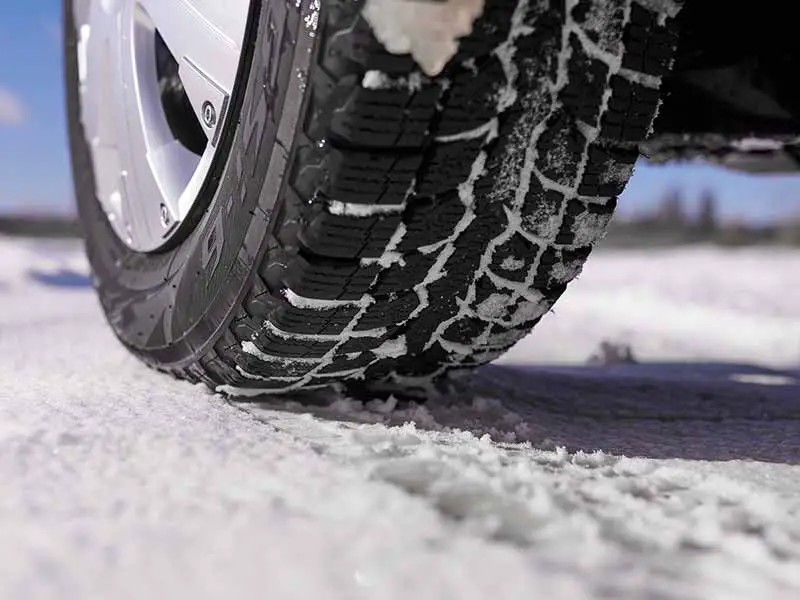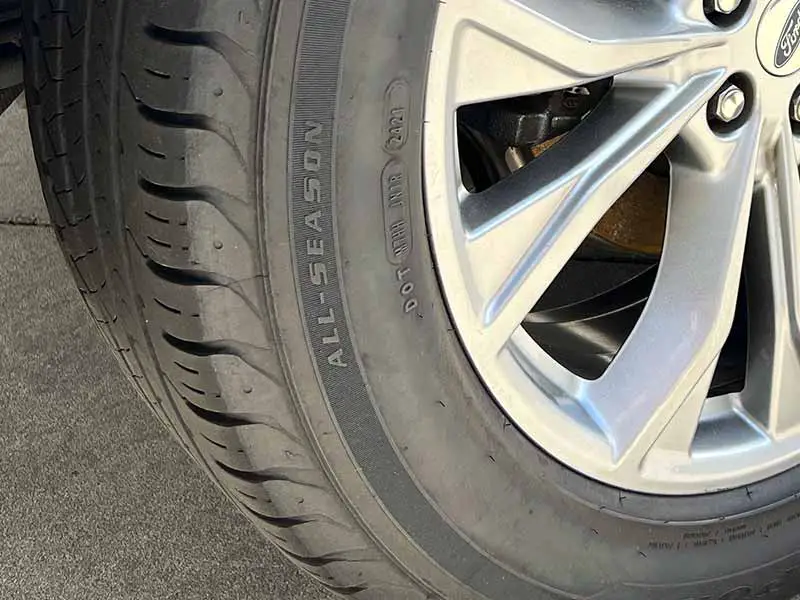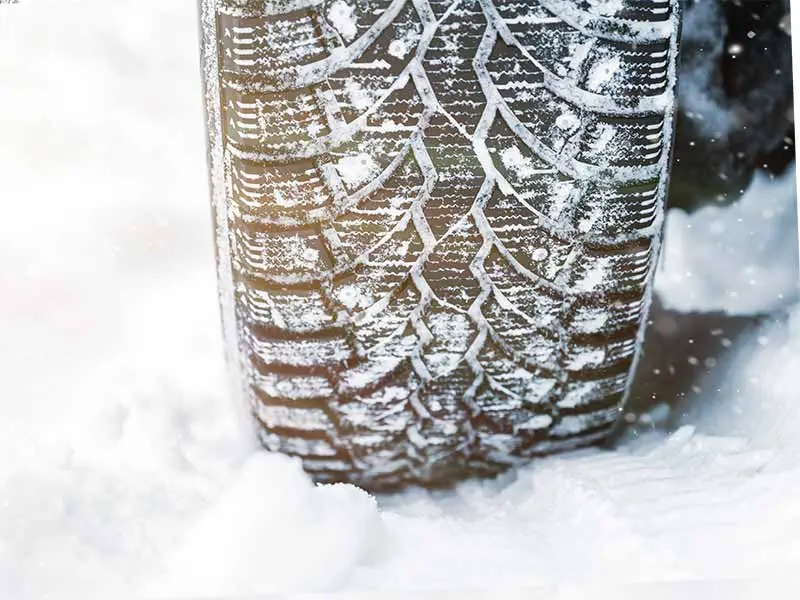Choosing the right tires for your car can be as crucial as choosing the right footwear for a hike. You wouldn’t want to wear flip-flops on a mountain trail, right? Making the right choice can keep you safe, help your car perform better, and even save you some money down the road.
Snow Tires Vs Regular Tires
Snow tires, designed specifically for cold weather and slippery conditions, provide superior traction and control in winter months compared to regular tires. However, regular all-season tires, offer balanced performance for a variety of conditions encountered throughout the year.
In this article, we’ll explore the differences between snow tires and regular tires, their performance under different driving conditions, and tackle common questions and debates. By the end, you’ll be equipped with the knowledge to make the best tire choice for your specific needs.
Let’s take a closer look.

Understanding Tires
The main job of a tire is to provide a cushion between your car and the road, and to grip the road so your car can move forward, backward, or sideways without slipping. It’s the tire that takes the brute force of road bumps and also the heat from braking.
Now, tires aren’t just made of rubber. They’re actually a complex blend of materials, including fabric and steel, all designed to provide strength, flexibility, and longevity. It’s a neat piece of engineering if you think about it.
There are different types of tires, each designed for a particular use or condition. To keep things simple, we’re mainly going to talk about two types in this article:
- Regular All-Season Tires: These guys are the Jack-of-all-trades in the tire world. They’re designed to handle a variety of conditions like dry roads, wet roads, and even a little bit of light snow. They’re like that one friend who’s pretty good at everything they try.
- Snow Tires (also known as Winter Tires): These are the specialists. Snow tires are specifically designed to perform in cold weather, snow, and ice. Think of them as the friend who’s not good at every sport, but is an absolute rock star when it comes to hockey.

Winter Tires: The Basics
Winter tires, also known as snow tires, are kind of like the superheroes of the tire world when winter comes around. Why, you ask? Well, they have a few special powers that make them stand out in frosty weather.
One major thing that sets winter tires apart from regular tires is their tread pattern. This is the part of the tire that touches the road. Winter tires have special tread patterns that are designed to dig into snow and ice, providing superior grip and better control. They’re like having hiking boots for your car!
Another big difference is the type of rubber used. Winter tires use a softer rubber compound that stays flexible in cold weather. Imagine if your hands were super stiff from the cold – it’d be pretty hard to hold onto anything, right? Well, the same goes for tires. When it’s cold, regular tires can get stiff and have a harder time gripping the road. Winter tires, on the other hand, stay flexible and keep their grip.
So, do winter tires make a difference? Absolutely! And here’s how:
- Front-Wheel Drive (FWD): With FWD, your car’s power is sent to the front wheels, which do most of the work. Using winter tires can significantly improve your car’s grip on the road, making it safer to drive in snow and ice.
- Rear-Wheel Drive (RWD): In RWD, the power is sent to the rear wheels. This can be a bit tricky in snow and ice because the front wheels might not get enough traction. Here, using four winter tires is typically a good idea, not just two on the rear. It’s like having a balanced team – the front tires steer and brake while the rear tires provide power.
- All-Wheel Drive (AWD): AWD cars send power to all four wheels, which is great for traction. But remember, AWD helps with going, not stopping. So, even with AWD, winter tires are still a good idea for better control in snowy or icy conditions.

Regular All-Season Tires: The Basics
Just like their name suggests, these tires are designed to handle just about everything Mother Nature can throw at them – within reason, of course.
So, what makes these tires “all-season”? Well, it’s all in the design. All-season tires have a more balanced tread pattern compared to winter tires. This means they can handle a variety of conditions – from dry and wet to light snow. However, in heavy snow or icy conditions, they won’t perform as well as winter tires.
The rubber compound used in all-season tires is harder and designed to last longer and provide a smoother ride in normal conditions. However, when the temperature drops, they might become too stiff and not grip the road as well. So, if you live somewhere with mild winters and don’t usually deal with a lot of snow or ice, all-season tires could be a good fit for you.
Let’s talk about how regular tires handle different drives:
- Front-Wheel Drive (FWD): For FWD vehicles, regular tires can handle most conditions reasonably well. However, when things get icy or snowy, winter tires could give you that extra bit of control and safety.
- Rear-Wheel Drive (RWD): With RWD vehicles, regular tires can be fine most of the time. But, if you’re facing snow and ice, having four winter tires can provide better balance and control.
- All-Wheel Drive (AWD): Even though AWD vehicles distribute power to all wheels for better traction, all-season tires might not provide enough grip in harsh winter conditions. While AWD can help you get moving, remember it’s your tires that help you stop.

Comparing Winter and Regular Tires
Alright, now that we’ve met our two main players, let’s put them head to head and see how they stack up. This is where things get exciting!
Performance in Different Weather Conditions:
- Dry and Wet Conditions: Regular tires win here. They’re designed to provide a comfortable ride and good traction in both dry and wet conditions. While winter tires can also handle these conditions, they might wear out faster because their softer rubber isn’t meant for warmer weather.
- Snowy and Icy Conditions: This is where winter tires shine. Their special tread patterns and flexible rubber compounds are built for this kind of weather. They provide superior grip and control in snow and ice compared to regular tires.
- Rain: Both tires handle rain reasonably well. However, all-season tires may have a slight edge because they’re designed for a wider range of conditions, including heavy rain.
In the end, both winter and regular tires have their strengths and weaknesses. It’s all about choosing the right tool for the job.

To Snow or Not to Snow: The Great Debate
Okay, we’ve done our homework, we’ve compared and contrasted, and now it’s time for the big questions. Let’s tackle some of the most common debates in the tire world.
Is it Better to Get Snow Tires or All-Season Tires?
Well, that’s a bit like asking, “Is it better to have a hammer or a screwdriver?” The answer is, “It depends on what you need to do!”
If you live in a place where winters are mild and snow is a rare visitor, all-season tires might be your best bet. They’re designed to handle a variety of conditions, and they can save you the trouble of changing tires when winter comes.
But if winter in your area means snow, ice, and freezing temperatures, snow tires can be a lifesaver. They’re designed to give you the best traction and control in those conditions.
Can Snow Tires be Used Year-Round?
Technically, yes. But should they? Probably not. Winter tires are made from a softer rubber that’s designed to stay flexible in cold temperatures. If you use them in warm weather, they can wear out faster. Plus, they might not handle as well on dry or wet roads as all-season tires. Think of it like wearing a heavy winter coat in the summer. It’s not dangerous, but it’s not comfortable, and your coat will wear out pretty quickly.
Do You Need Snow Tires if You Have AWD?
Even if your car has AWD, which can help your car get moving in the snow, it’s the tires that determine how well your car can turn and stop. So, even with AWD, winter tires can provide better control and safety in snowy and icy conditions. Think of AWD as the muscles of your car – it can help you push through the snow. But tires? They’re like your shoes – they determine how well you can walk or run on different surfaces.
Do Snow Tires Wear Out Faster?
Snow tires are made of a softer rubber that can wear out faster in warm weather. But in cold weather, they should wear at about the same rate as all-season tires. It’s all about using them in the right conditions. If you use a pair of ice skates on a concrete sidewalk, they’re going to wear out pretty quickly, right? The same principle applies to winter tires.
Remember, choosing between snow tires and all-season tires is all about understanding your needs and what you want from your tires. Consider where you live, what kind of weather you usually drive in, and how much driving you do. Whether you choose the well-rounded all-season tire or the winter weather specialist, it’s all about finding the best fit for you.
Resources
Below are some links you may find helpful when learning about tires
- What’s the difference between snow tires and regular tires? – Firestone
- Comparing winter & snow tires vs. all-season tires – Bridgestone
Final Thoughts
If there’s one key takeaway from all of this, it’s that there isn’t a one-size-fits-all answer when it comes to choosing between snow tires and regular tires. It all comes down to where you live, what kind of weather you face, and what you need from your tires.
Remember, it’s all about picking the right shoes for your car. So whether you’re gearing up for a winter wonderland, or cruising through all four seasons, the right set of tires can make all the difference.
Good luck and happy motoring.





